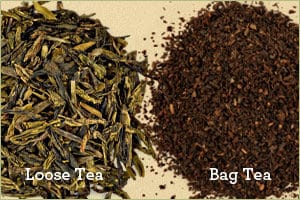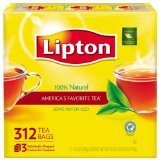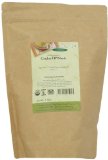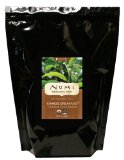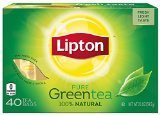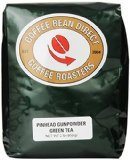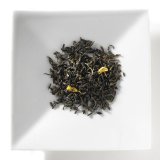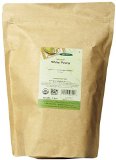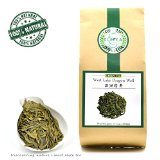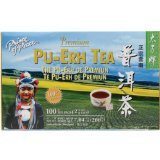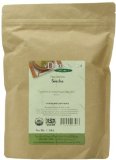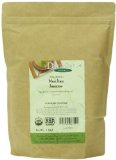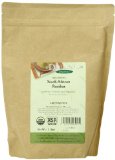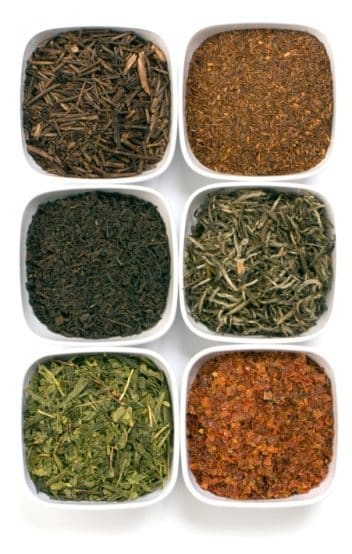What is the Best Tea For Brewing Kombucha
Kombucha is directly linked to an ancient plant first cultivated in China: the Camellia sinensis bush, or tea plant. You can read about the origins of kombucha in this article. When we talk about tea to use for brewing kombucha, we usually mean black tea, green tea, or one of the other types of tea that all come from that same plant. “Herb tea” is more properly called a tisane, to use the French word. There are other brews like yerba mate that some people call “tea” as well, and these are also made out of plants other than Camellia sinensis. In this article, you’ll find out how each of these plant types work for kombucha, and which you should choose to make the best kombucha.
Why Use Tea?
The kombucha organism, or SCOBY, grows in and on tea leaves. It’s a specialized group of yeasts and bacteria that evolved to feed on Camellia sinensis leaves, and therefore will grow best when that type of tea is used. The tea leaves provide the essential nutrients that the SCOBY needs to grow and stay healthy, like nitrogen, theanine, and caffeine.
But it’s not just the SCOBY that benefits from tea; you’ll get the healthy nutrients from tea when you drink your finished kombucha. Tea contains a rich source of vitamin B2 (riboflavin) and also adds to the vitamin C content of kombucha. Tea is also a good source of polyphenols and other antioxidants. They add to the already significant health benefits of kombucha that are detailed in this article.
Loose-leaf Tea or Tea Bags?
Which you choose will depend on how much you’re brewing, what types of tea you want to use, and which types of tea are available near you.
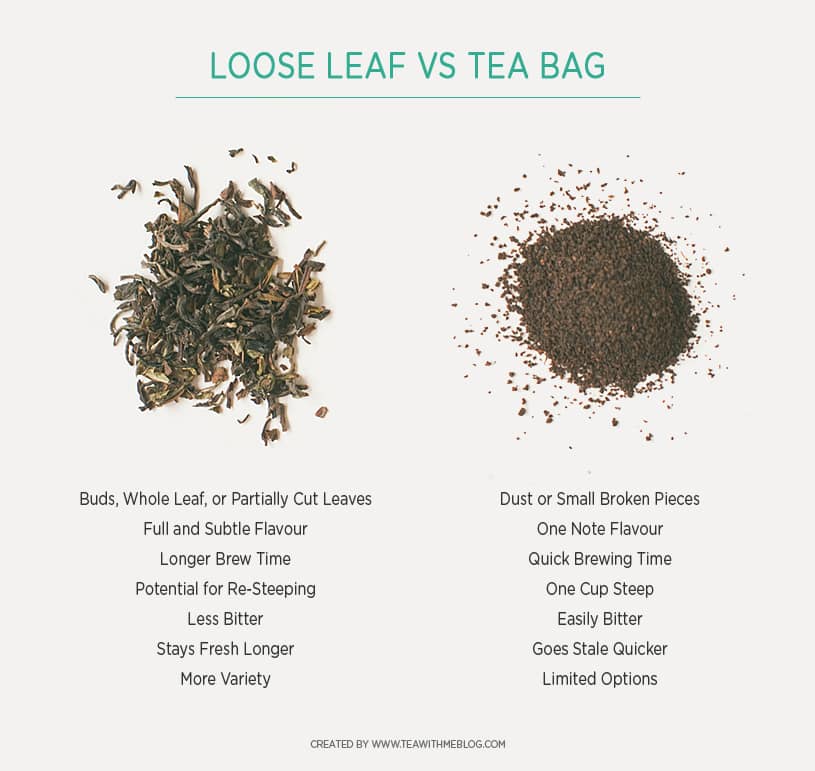
In general, you’ll have more flexibility with loose-leaf tea, and since you can buy it in just the quantity you need, it will be fresher than tea in bags. Without a double, Loose Leave is a much higher quality sort of tea and delivers a better taste. As such we recommend it over tea bags every time.
But, it’s also usually more expensive than Tea Bags. So if you are trying to brew Kombucha the Cheapest Possible Way, you will probably want to look at Tea Bags in bulk. Still, you can brew awesome tasting Kombucha with regular old tea bags just fine. I’ve done it many times with the cheapest tea bags out there (Lipton Yellow Tea bags) and the Kombucha tastes great.
Keep in mind that while the choice of Tea type and quality of tea IS very important to the Kombucha taste, it’s also only ONE element (albeit an important one). At the end of the day, we are making Kombucha, not TEA.
Teas to Avoid
- Flavored teas. These often contain oils or chemicals that will negatively affect the brewing process, or even harm your SCOBY.
- Medicinal herb teas. Some of these contain antibacterial agents, and since your SCOBY is made of bacteria, that’s the last thing you want in your brew!
- Highly smokey or other strongly-flavored teas. If they’re made with leaves from the Camellia sinensis plant they’ll still be good from the SCOBY’s viewpoint, but you might not like the flavor of the finished kombucha.
- Decaffeinated tea. The SCOBY uses the caffeine as a nutrient. There is not much left in the finished kombucha, which will be lower in caffeine than regular brewed tea or coffee. You can use Decaffeinated tea to experiment with with EXTRA SCOBYs, but don’t expect the SCOBY to do well (you may have to toss the SCOBY after, just as if you make Kombucha Coffee).
NOTE: Although it’s not recommended to use smoked teas, flavored teas, or herb teas in the initial brewing process (primary fermentation), you can easily experiment with them after you remove the SCOBY and move on to secondary fermentation.
To get some ideas of how you can use different teas to get different flavors, read this article.
If you want to experiment with different types of teas for the first fermentation and you have some spare/extra SCOBYs, it is possible to brew Kombucha with some of the teas we’ve advised against. Just keep in mind they are not optimal for your SCOBY health/growth and you may end up damaging or killing it. But if you have extra SCOBY’s and you want to experiment, go ahead.
The Broad Types of Tea
There are many varieties and sub varieties of tea. However, we can broadly divide tea into the following:
- White
- Yellow
- Green
- Oolong
- Black/Red
- Post-Fermented
- Riboos Tea
- Herbal Teas
All tea comes from the basic tea plant, the Camellia Sinensis plant. The differences between the tea types come from the processing, the different growing conditions, and of course, the geography. There are over 3000 varieties of tea out there, so you have a LOT of choices. Given that we are only mentioning a handful of broad tea types, we are leaving quite a lot out. Each type of tea has many, many varieties, so we don’t claim this is the most comprehensive article about tea, but it IS the most comprehensive article about TEA Types and Kombucha on the web!
You can use ANY basic tea for making Kombucha and depending on your choice, you will get a slightly different tasting brew. The most common tea used for Kombucha is BLACK tea. however, Green tea or Oolong tea works just as well, though giving of a more earthy flavor. A popular combo is to mix both green and black tea together. If you want to get experimental, you can mix and match different teas for Kombucha growing.
The Best Teas for Kombucha
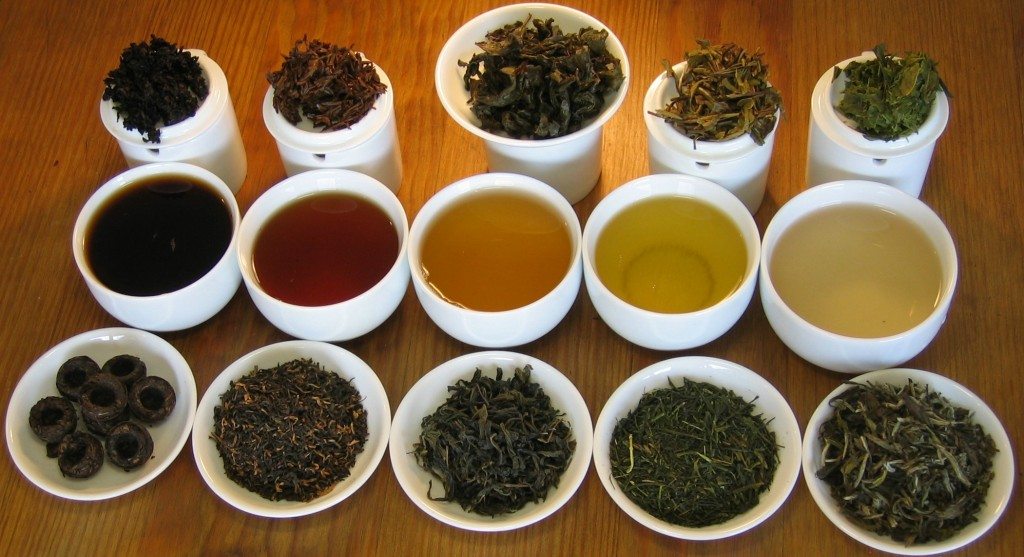
We list here the best teas for brewing kombucha. These range from the very common (and cheap) household black and green teas, to some of the more exotic and finer teas. Keep in mind though there are literally thousands of varieties of teas — if you really want to play with flavor, you can experiment with various sub varieties of tea and see what happens.The following teas below are recommended though for optimum SCOBY health. The wrong teas can kill or harm your SCOBY.
Black Tea

Varieties: Ceylon, Darjeeling, Assam, English Breakfast, Irish Breakfast
Black tea is a fully oxidized form of the Camellia sinensis tea leaf, and keeps its flavor for several years. The leaves are picked, left to wilt, oxidized (fermented), and then dried. The quality and flavor of the tea will depend on the way it has been processed and packaged, how old the tea is, and whether the blend is mostly whole tea leaves or “tea dust.” When you buy loose-leaf tea, you’ll be able to see whether or not the leaves have been left whole. Smell the tea; an aromatic tea will be fresher and have more of the polyphenols and nutrients you and the SCOBY need.
Although all black tea comes from the Camellia sinensis plant, the qualities of the tea depend on where it was grown as much as how it was processed. Most tea comes from China, India, or Sri Lanka. Some black tea will have a fruity aroma, while others will remind you of chocolate, honey, or even beer. If you have a tea shop near you that sells good-quality loose tea, you can buy a little bit of several varieties, make brewed tea with each of them, and see which flavors you prefer.
Health benefits of black tea:
- improves circulation and blood pressure
- helps regulate digestion
- helps prevent tooth decay
Black Tea for Kombucha
In general black tea is the best choice for making kombucha because it’s rich in all of the nutrients that the SCOBY needs. You can also blend black tea with other types of tea to use in the primary fermentation process. Black tea, because of the tanins, will STAIN your SCOBY brown/orange color over time. This won’t affect the SCOBY health in the least or the taste, but if you are after the WHITE SCOBYs (say to sell them), you will want to look at using something like Green Tea which does not have any tannin. Or you may want to do a blend of 70 percent green tea and 30 percent black tea.
Best Black Tea Recommendations
The Cheap Option
Lipton’s Black Tea Bags (312 bags)
Variety: English Breakfast
If you are looking for the absolute cheapest option at the cost of ‘quality’ well nothing comes cheaper than regular old Lipton Black Tea Bags. These are devastatingly cheap and, if you are concerned with the mighty dollar over the best quality or healthiest option, then these tea bags will work just fine. I’ve used these multiple times to test out how the Kombucha tastes, and, honestly, it’s not bad at all. I still prefer higher quality tea, but these will still make a good enough Kombucha.
The Middle of the Road Option
Davidson’s Tea Bulk Black Tea (16-Ounce Bag)
Variety: English Breakfast
If you don’t mind spending a bit more for a higher grade black tea, Davidson’s Black Tea is a good deal. It’s bulk size at 16 ounces and it’s high quality, organic tea. It makes a much better tasting tea than the cheaper Lipton’s bags, but you will pay more money for it.
Still, if you want a higher quality tea and a better taste, then go with this option.
The Best Quality Option
Organic Tea Chinese Yunnan Black Tea Leaves (16 Ounce Bag)
If you want a better (yet still reasonably priced) black tea, I recommend this Yunnan Black Tea. It’s organic tea leaves straight from China — the source for the best tea leaves in the world. Yunnan is a higher altitude area in Western China where tea is grown on the mountains — and has been for thousands of years. It’s one of the best places for organic tea in China (I have personally been there myself).
If you want premium, I recommend this. And for only 21 or so dollars, it’s still reasonably priced on Amazon — certainly MUCH cheaper than you can find in your local grocery store.
Here’s a list of 8 of the best BLACK teas on Amazon that are great for Kombucha. These are all BULK (mostly loose leaf tea). Any one of these will make a fantastic Kombucha.
Green Tea
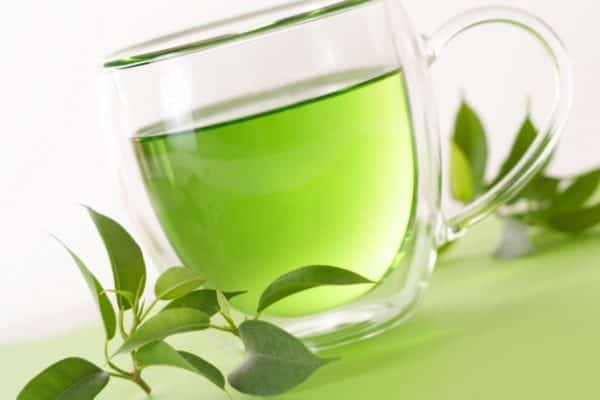
Varieties: Gunpowder, Sencha, Bancha, Jasmine
Unlike black tea, the Camellia sinensis leaves are minimally oxidized. The leaves are usually steamed before being dried, and do not go through the fermentation process. The tea is lighter in color and flavor, and can have a mineral tang or a slight grassy flavor. Using jasmine tea (green tea and dried jasmine flowers) produces an amazing floral kombucha. There are as many varieties of green tea as black tea, so again it’s worth your time to find a source for loose-leaf tea and test some of them before deciding which to use.
Health benefits of green tea:
- contains high levels of antioxidants
- helps lower cholesterol
- boosts the immune system
Green Tea for Kombucha
SCOBYs also grow well in a sweetened green tea, though some people notice a difference in the thickness of the SCOBY over time. Try a blend of 80% green tea and 20% black tea if you prefer the flavor of a green tea brew, but want to keep your SCOBY in top shape. Using green tea may also speed up the fermentation of the kombucha, which will affect your brewing time.
Also note that Green Tea tends to give your Kombucha color a lighter color vs black tea or a darker variety of tea. Because Green Tea lacks the Tannins found in Black Tea, the SCOBY also stays whiter and does not stain a darker shade of brown, gray, or orange as is won’t to happen. So if you like the big white fat SCOBYs, you are best off using a Green Tea.
To get more information on how to judge the length of time to brew kombucha, read this article.
Best Green Tea Recommendations
The Cheap Option
Lipton Pure Green Tea (240 Tea Bags) If budget is your concern, you can get by fine with this pack of Lipton’s Green Tea bags. It’s natural tea with no extra flavorings added, so it will work for Kombucha. Green tea is more expensive than Black Tea and provides a different taste (more earthy). Overall, this is a good pack for people just getting into Kombucha, who want to try Green tea without spending more money.
The Middle of the Road Option
Pinhead Gunpowder Loose Leaf Tea (2 Pound Bag) This is a good quality tea that offers some real value while provided the taste and quality needed to brew up awesome tasting Kombucha. It’s loose leaf tea and better than the Lipton’s option. For only $20 dollars for 2 pounds of tea, it’s a very good value for what you get, considering the quality of the tea.
The Best Quality Option
Organic Spring Jasmine (1 Lb) If you can afford this ($35), this is a quality loose leaf tea. It’s Jasmine tea, which provides a particularly nice tasting Kombucha. I highly recommend this option if you are interested in producing the best quality, besting tasting Kombucha brewed with green tea. Here’s a list of quality (and value) Green teas on Amazon. These are all good to use for Kombucha making if you want a green tea base.
White Tea
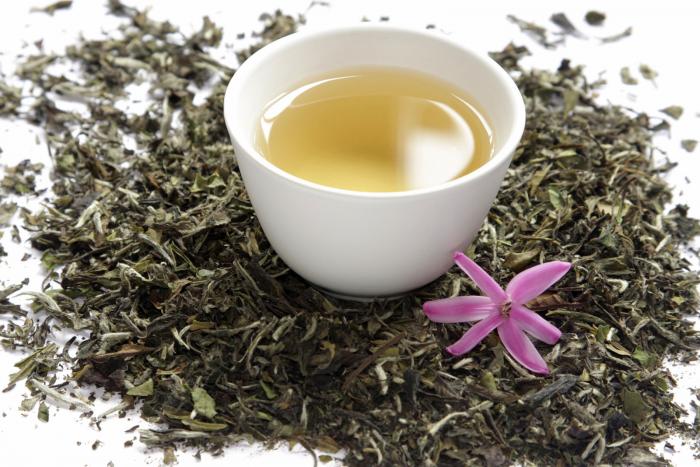
Varieties: White Peony, Silver Needle, Shou Mai, Darjeeling White
White tea is even less processed than green tea, so it has the most delicate flavor. To make white tea, only the youngest tea buds and leaves are picked, allowed to wither in the sun, and then air-dried. The brew is light, slightly sweet, and has overtones of honey and stone fruits.
Health benefits of white tea:
- high in antioxidants
- helps eliminate free radicals
- contributes to lower cholesterol
White Tea for Kombucha
Because it’s so mild, you might not find the resulting kombucha to be as full of flavor as you want if you are used to the stronger teas, and some people have experienced problems with maintaining the health of their SCOBY by only using white tea.
However, white tea is one of the rarer tea’s, it’s more expensive than the other choices, and the flavors are arguably more subtle and complex. If you are an advanced brewer and looking to really pull some unique flavor out of your Kombucha, white tea may just be the best choice. You can also mix white tea with a blend of black and/or green teas.
Best White Tea for Kombucha
Davidson’s Tea Bulk, White Peony 16-Ounce Bag
I personally find white tea the fullest flavor when it comes to making a great tasting Kombucha. It’s a more challenging tea to work with but the results can be worth it. White tea is a more premium tea than Black or Green tea and it’s more expensive. This Davidson’s tea is the best quality and value I’ve found. It’s about 25 dollars for a 16 ounce bag which is a good deal indeed.
If you want more White Tea recommendations, here’s some of the best white teas you can buy on Amazon. All of these will make a very interesting flavored Kombucha.
Oolong Tea
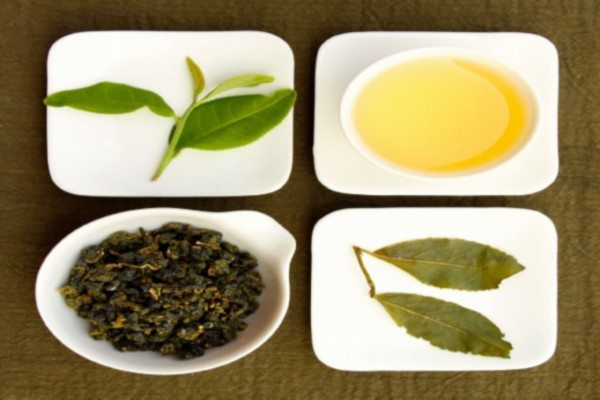
Varieties: Da Hong Pao, Jin Xuan, Alishan, Iron Buddha
Between green tea and black tea lies oolong tea, which has been partially fermented, though not as oxidized as black tea. The flavor is milder than black tea, but not as “grassy” as green tea.
Since “partially fermented” leaves a wide range of options for tea producers, there’s also a wide range of flavors from the different varieties of oolong tea. You’ll have to experiment to see which one you like best.
Health benefits of oolong tea:
- lowers blood sugar levels
- helps eliminate stored body fat
- increases metabolism
Oolong Tea for Kombucha
SCOBYs like this tea because it combines the tannic elements of black tea with the super polyphenols in unprocessed green tea. The flavor profile tends to be more complex than with regular black and green teas. Depending on the type of Oolong, you can get a more fruity flavor like your standard black tea or a more grassy and light flavor like a green tea or somewhere in the middle.
Best Oolong Tea for Kombucha
The Cheaper White Tea Option (Middle of the Road)
Prince of Peace Tea, Oolong, 100-Count
This is a good value option for Oolong. Oolong makes a better Kombucha than your basic green or black, in my opinion, though the flavor may be a bit different than what you are used to with the basic teas. Typically, it has a fruity flavor. I recommend this specific brand of tea because you get good value for quality. This band is organic and you get 100 packs. Because Oolong is a more exotic, fancier, and expensive tea than green or black, you won’t find this available as a bottom of the barrel cheap tea option. As such it’s either Middle of the road or high end. But worth it!
The Best White Option (Middle of the Road)
Prime Quality Chinese Daily Green Tea 7.1 Ounce Bag
This is a better tea option and higher quality, than my previous recommendation, but at a higher price. If you want the best tasting Oolong tea (short of going to China yourself and sourcing some from a mountain village), I recommend this brand and this tea specifically.
Pu-erh Tea
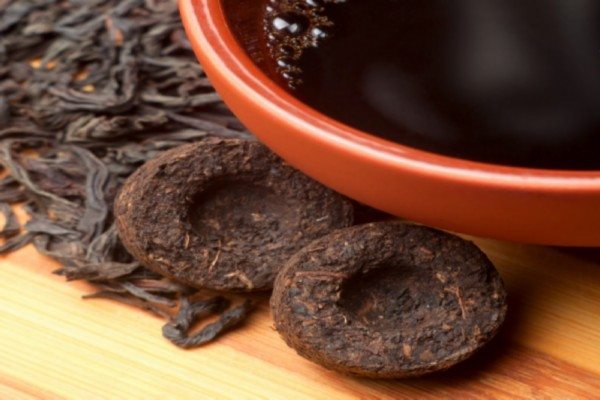
Varieties: Kai Yuan, Chang Hu Yao, Yunnan Jing Mai, Lao Kang Tuo Cha
Sourced from a region in the Yunnan province of China, Pu-erh tea has been dried, fermented, compressed, and aged. Unlike the other teas on this list, Pu-erh is fermented by being mixed witha bit of water then being buried in the earth for a few weeks. Like kombucha itself, the properties and flavors of the tea change in the fermenting and aging process. Pu-erh teas are full-flavored, rich, and compelling. The varieties are classified depending on the shape of the compressed tea, the region it comes from, the factory or company that made it, and the length of time it has been aged. Some pu-erh tea is aged for more than 10 years!
I’ve actually been to the Yunnan province myself a few years ago. It’s a wonderful, beautiful part of china, in a region that connects South East Asia (Lao) with China at the south and in the north it borders Tibet. This was the province that historically linked the Silk Route from Asia to South East Asia & India. There is a strong tea culture in Yunnan, and some of the best tasting teas originate in the mountainous areas (some areas are about 3000-4000 meters above sea level with mountains that are about 7000 meters tall!) .
Here are, in fact, some pictures I took a few years ago when I traveled from one end of Yunnan to the other.




So as you see, it’s a beautiful region that has a very good climate for tea. And Pu-erh tea is widely available there (you can see it sold everywhere in stacks that look like cookies).
Health benefits of pu-erh tea:
- improves digestion
- helps lower cholesterol
- good for the circulatory system
Pu-erh Tea for Kombucha
Use common sense when picking pu-erh teas for making kombucha. If you don’t like the flavor of the tea, you probably won’t like the flavor of the kombucha. With flavors profiles that can remind you of the taste of mushrooms, dried fruit, melons, tobacco, and more, you can easily pick a tea you like. Because the flavors and aromas of pu-erh tea can be so strong, it may work best for you when blended with other milder teas. This is a tea you may want to try when you are more comfortable brewing Kombucha and want to experiment with different flavor profiles.
It makes sense that SCOBYs, which are responsible for fermenting tea, would like a fermented tea to “eat” themselves, and many people say that using pu-erh tea, alone or in a blend, makes for the healthiest SCOBY.
Best Pu-erh Tea for Kombucha
Prince Of Peace Tea Premium Pu-erh Tea, 100 teabags
Pu-erh Tea is a different sort of tea than the others, being fermented. It adds an interesting flavor profile to Kombucha — one that you can taste. If you are ready to start experimenting with different Kombucha tastes, I recommend this — the results can be pretty delicious.
Sencha Tea
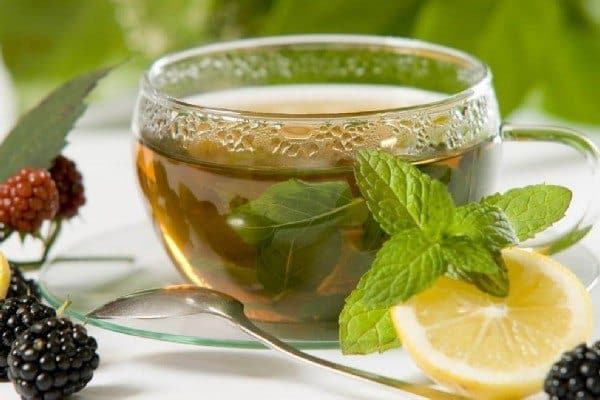
Sencha is a variety of green tea, but more more complex in flavor. Sencha is from a tree that is harvest several times a year. The first harvest harvest though (known as Shincha) are most tender and product the highest quality tea. As such, Sencha makes a fantastic green-tea style kombucha that’s grassy and a bit dry.
Senchai Tea for Kombucha
This is a good choice for quality Kombucha. It will taste somewhat grassy like Green tea, but different. I like to think of this as the champagne version of Kombucha. Sencha is widely available (though more expensive than your basic green tea), so you shouldn’t have any problems getting your hands on it. Since it’s a lighter green tea, your SCOBYs will stay nice and white. Also try blending it in a 50/50 mix with Black Tea or one of the other teas for additional flavor changes.
Best Sencha Tea
Davidson’s Tea Bulk, Sencha, 16-Ounce Bag
For quality Sencha Green tea at a good price, we recommend the Davidson brand. You can’t beat what you get for the price and it’s certainly cheaper and better than what you could buy at your local grocery store.
Jasmine Tea
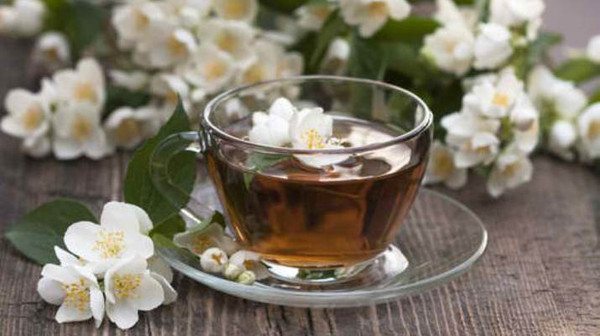
Another variety of the basic green tea, Jasmine Tea are tea scented with jasmine blossoms. The tea leaves are mixed in with jasmine blossoms which impart a flowery scent into the tea leaves. As such, Jasmine Tea’s give Kombucha a nice, aromatic flowery note.
Jasmine Tea for Kombucha
This is not your usual sort of tea used with Kombucha, but it does work. Just make sure you use the NON-flavored versions. Sometimes, flavors are added into the tea which will hurt your SCOBY during the first ferment. But as long as no flavors are soaked into the tea besides just flowers, your Kombucha SCOBY should do just fine in it. If you are concerned, use a backup SCOBY and try a brew with quality Jasmine tea. If you see no problems with your SCOBY and the brew, then it looks like that variety of Jasmine tea does well with your SCOBY.
It should be said, get a high quality, organic Jasmine Tea for best results.
Best Jasmine Tea
Davidson’s Organic Tea Bulk, Mao Jian Jasmine, 16-Ounce Bag Bag
This is organic Jasmine in bulk. You get high quality tasting Jasmine tea and a decent amount of it for the price at $20. I’m a big fan of Davidson’s teas if you haven’t noticed yet. They taste good, are reasonably priced for a bulk size, and they are ORGANIC.
Rooibos Tea
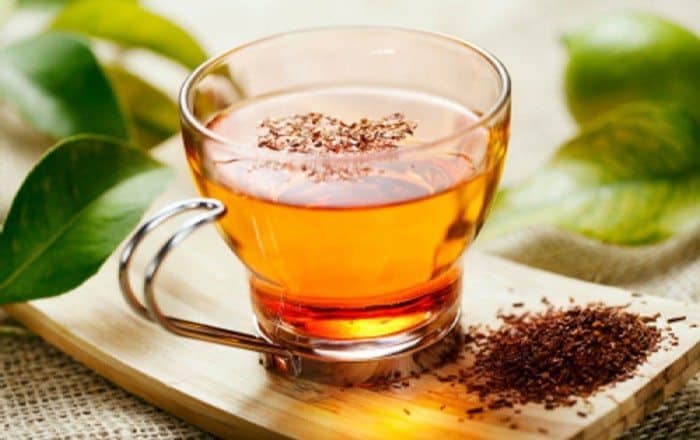
Your SCOBY needs tea to survive (tea with camellia sinensis in it). However, there is one exception: Rooibos tea. This tea is actually a herbal tea and comes from apalathus lineraris, not camellia sinesis (tea leaves) and is caffeine-free.
Roobios Tea for Kombucha
Because Roobios is caffeine free, this makes Rooibos an interesting choice to substitute for regular tea when making Kombucha. You can make a caffeine-free Kombucha by using Rooibos — and it will taste like regular Kombucha for the most part with some subtle differences. Keep in mind though you will still have to rotate your SCOBY once in a while into brews with regular tea (camellia sinesis) or your SCOBY will not do well over the long term (it needs caffeine, remember).
The flavor profile is quite a bit different with regular Rooibos (it’s not a member of the tea species) vs tea, and as such you’ll get a Kombucha that’s strongly flavored and different than anything you’ve tried before. I highly recommend you try it. You can always do a partial blend of Rooibos + Blacktea or Green Tea which adds a nice mix of flavors and your SCOBY will still have caffeine to live on. If you do pure Roobios, use a backup scoby or rotate your SCOBY back into a tea base for the next brew.
Best Rooibos Tea
Davidson’s Tea Bulk, Organic South African Rooibos, 16-Ounce Bag
Rooibos is an interesting option as you can make CAFFEINE free kombucha by using it. For the most part, your SCOBY can grow fine in it as long as your rotate every few cycles with regular (caffeinated) tea.
Davidson’s Organic Rooibos is a good deal — 16 ounces and under 15 dollars. I highly recommend it if you want to use Rooibos as your base tea.
Herbal Teas and Tisanes
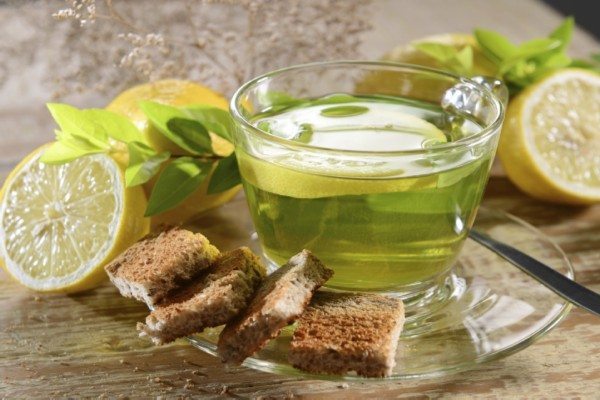
Varieties: Yerba Mate, Peppermint, Hibiscus, Chamomile
Once you have a well-established SCOBY, you can start experimenting with adding different “teas” that don’t come from the Camellia sinensis plant. While a SCOBY will do best if it’s got enough black tea to provide it with the essential nutrients it needs, you can reduce or even eliminate the real tea from your blend for a short period of time (one or two brews) before your SCOBY starts to degrade. Your SCOBY can live without real tea for a short period of time. This is where herbal teas and other mixes that don’t have any Camellia sinensis in them. You can even make Kombucha coffee, for example!
However, it’s not a good idea to completely eliminate all tea from your long-term process. The SCOBY will probably not survive unless you feed it what it needs on a regular basis. A better way to add the flavors of many herb teas is to incorporate them in the second fermentation process. Learn more about second fermentation in this article.
A good rule of thumb is “1 to 3” and you have two ways to follow this rule:
- Use one part black or green tea to every three parts non-tea leaves in your blend.
- Do one batch of full-tea kombucha after every three non-tea brews.
Another good way to make sure you don’t accidentally lose your SCOBY is to wait to experiment with non-tea blends until after you have a good supply of SCOBYs on hand. Read about how to maintain the long-term health of your SCOBYs in this article.
Avoid using teas that are flavored with essential oils or artificial chemicals, which will harm your SCOBY. You will also need to avoid using herbs that contain natural oils, such as peppermint and sage, during the first brewing stage. The oils, although natural, will interfere with the SCOBY’s ability to get the oxygen it needs.
When you use natural plant materials, you’ll also get all of the benefit from the nutrients and components in those plants. Some of these nutrients benefit from going through the fermentation process of the primary brewing cycle when you’re making kombucha; in essence, the SCOBY “chews” the nutrient food for you, so that your body can metabolize it more quickly when you drink the finished kombucha tea. That’s one of the reasons why adding herbs with well-known health benefits can help you make a healthier kombucha tea. Here are some of the most popular herbal additions to kombucha tea:
- Raspberry leaf – antibacterial and a good digestive aid
- Dandelion – good for improving liver health and purifying the blood
- Elderflower – a vitamin-rich spring tonic
- Stinging nettle – anti-inflammatory that helps with rheumatism
- Chamomile – reduces gas and helps soothe the nervous system
For more ideas about ways to add both flavor and health to your kombucha brew, check out the recipes in this article.
The Final Word on Choosing the Best Tea for Kombucha
We often think of adding flavor to Kombucha as a separate thing, done during the second ferment where you mix fruit, spices, and herbs to infuse more flavor to the brew. But choosing the initial tea is perhaps one of the most flavor influencing things you can do to your kombucha. There is a whole world of different tea combinations and varieties — each will add a different note of flavor to your Kombucha.
We give here some of the broad basic tea’s suitable for your Kombucha brew, but do note that if you enter the world of FINE teas (the mores subtle varieties of tea that tea drinkers fawn over), you can really change the way your kombucha tastes. Experimenting with fine teas, however, is something you don’t want to do until you are comfortable with brewing Kombucha and you’ve tried all the basic tea flavors and combinations on this list. And you have spare SCOBYs to experiment with.

